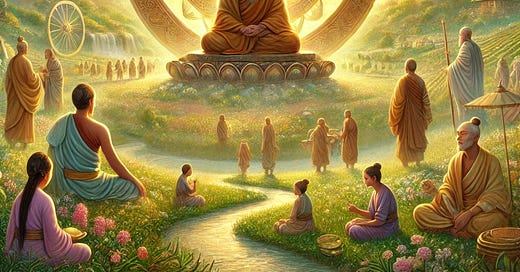TheGentleLaw Community
The Cakkavatti Sutta (DN 26), also known as "The Discourse on the Wheel-Turning Monarch," is one of the most profound teachings in the Dīgha Nikāya, offering a narrative of the ideal ruler and the cyclical nature of human society. It combines elements of political philosophy, ethics, and cosmology, laying out a vision of how the righteous rule can lead to peace and prosperity and how its eventual decline mirrors the broader decay of human civilization.
The Wheel-Turning Monarch
The central figure in the Cakkavatti Sutta is the "Cakkavatti" or "Wheel-Turning Monarch," a righteous and wise king whose reign is symbolized by the turning of a great wheel. This monarch rules over the entire world, establishing justice, compassion, and order. He is not merely a political leader but an embodiment of the Buddha's teachings in action.
According to the Sutta, the Wheel-Turning Monarch’s reign is marked by moral righteousness (dhamma), which results in prosperity and happiness for all beings. The monarch upholds the five precepts of ethical conduct and ensures that justice prevails in every aspect of life, creating an environment where the people are free from suffering. His reign is a golden age, where resources are abundant, people are healthy, and society thrives in harmony.
The Decline: From Righteousness to Greed
The Sutta, however, doesn’t end with the glorious reign of the Cakkavatti. It paints a picture of inevitable decline. As time passes, even the most righteous monarch will eventually lose the ability to rule justly. The teachings of the Dhamma will be forgotten, and greed, hatred, and delusion will take over.
The Sutta describes how the decline starts when the people begin to abandon the five precepts and indulge in wrong actions. Corruption spreads through society, rulers lose their ethical grounding, and eventually, wars and conflicts arise. This decline is symbolic of the cyclical nature of the world itself, where everything—whether it be individuals, societies, or even entire civilizations—goes through cycles of rise and fall.
The Sutta also offers insight into how such a decline can occur: through the abandonment of moral and spiritual principles, ignorance takes root, and the balance between the material and spiritual realms is disrupted. This results in an inevitable downfall, leading to widespread suffering and the eventual destruction of the world as it was known.
The Buddha’s Solution: A Return to Righteousness
In the midst of this decline, the Buddha offers a remedy: the return to righteous living. Just as a wheel can be turned in the opposite direction, so too can society return to its golden age by adopting the principles of Dhamma, starting with ethical conduct and mindfulness.
The Cakkavatti Sutta reminds us that although societal decline is inevitable, the practice of the Buddha's teachings offers a way to mitigate suffering and create a better world. Individuals, even within a corrupt society, can find peace and prosperity by adhering to ethical conduct, developing wisdom, and practicing mindfulness.
Why This Sutta Matters Today
The message of the Cakkavatti Sutta resonates deeply with us today. It speaks to the cycles of rise and fall we observe in civilizations, empires, and even in our personal lives. It’s a reminder that true happiness and prosperity don’t come from material wealth or power, but from living ethically, cultivating wisdom, and following the path of the Buddha.
As we witness increasing conflicts, environmental degradation, and social inequality, the Cakkavatti Sutta challenges us to reflect on the values that guide us. How can we, as individuals and as a society, return to righteousness? How can we live in harmony with one another and the world around us?
The Cakkavatti Sutta serves as both a warning and an inspiration. It reminds us that we must be vigilant in our practice and mindful of the ethical principles that govern our lives. If we can steer our personal and collective actions towards righteousness and compassion, we can prevent the decline that this Sutta foretells. By turning the wheel of justice and wisdom in the right direction, we can create a world of peace and prosperity for all.





